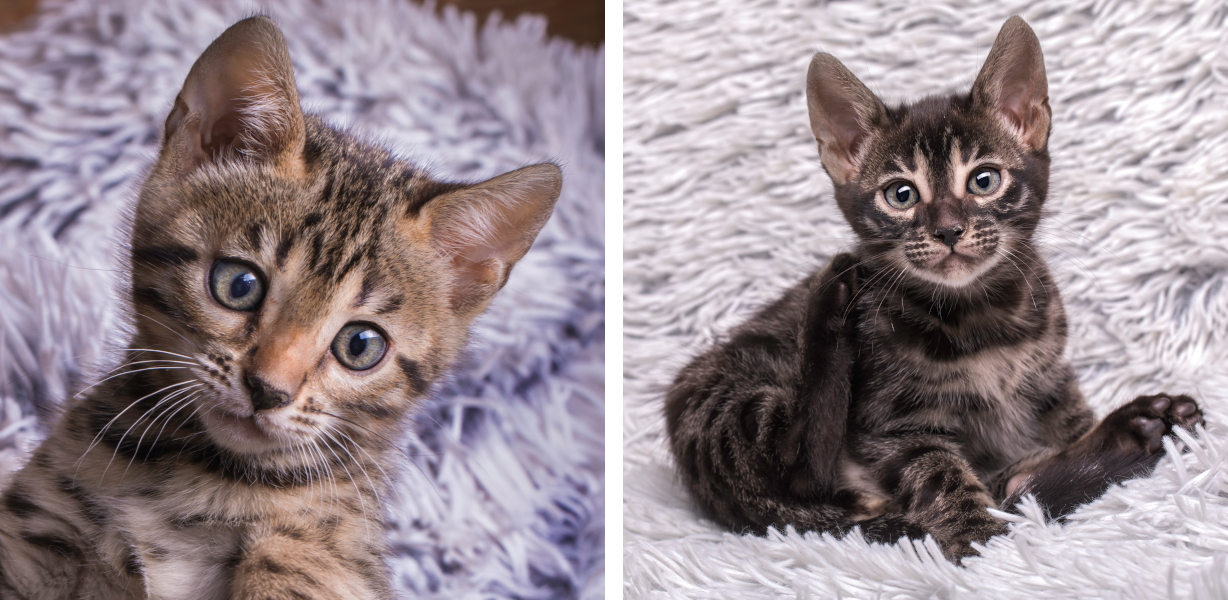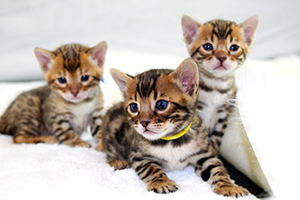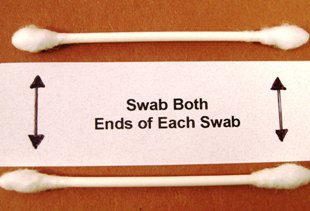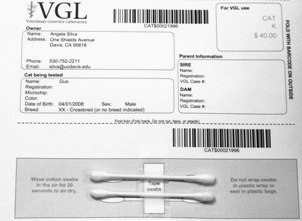Quick Summary

Click here for Price and Turnaround Time
Phenotype: Charcoal Bengals sport an unusual coat marking of a darker face mask and dark thick dorsal stripe ("cape"). The markings on these cats are darker and more extended than those seen on non-charcoal Bengals.
Mode of Inheritance: Not yet fully understood; APb variant appears to not be fully dominant over a variant
Alleles:
A = Agouti variant (Domestic Cat)
A2 = Agouti variant (Bengal and Savannah cat)
APb = Agouti variant (Asian Leopard Cat)
ALs = Agouti variant (Serval and Savannah cat)
Ajc = Agouti variant (Jungle Cat and Chausie)
a = Non-agouti variant (Domestic Cat)
Breeds appropriate for testing: Bengal
Explanation of Results:
- Cats with APb/a genotype are expected to have charcoal patterning and can produce charcoal offspring depending on the genetics of the mate.
- Cats with the following genotypes are not expected to have charcoal patterning, but they have a copy (or copies) of the Asian Leopard Cat agouti variant and can produce charcoal offspring depending on the genetics of the mate (mate must have non-agouti variant a in order to produce charcoal offspring):
- APb/ A
- APb/ A2
- APb/APb
- APb/ ALs
- APb/ Ajc
- Cats with the following genotypes are not expected to have charcoal patterning, but they have a copy (or copies) of the Domestic Cat non-agouti variant and can produce charcoal offspring depending on the genetics of the mate (mate must have Asian Leopard Cat agouti variant APb in order to produce charcoal offspring):
- A2/a
- ALs/a
- Ajc/a
- A/a
- a/a
- Cats with the following genotypes are not expected to have charcoal patterning, have no copies of the Asian Leopard Cat agouti variant, and cannot produce charcoal offspring:
- A/A
- A/A2
- A2/A2
- ALs/A
- ALs/A2
- ALs/ ALs
- ALs/ Ajc
- Ajc/A
- Ajc/A2
- Ajc/Ajc
Bengal Coat Color Panel
$57 per animal
Birman Coat Color Panel (Bengal Coat Color + White Gloves)
$57 per animal
Cat DNA tests are carried out using cells brushed from your cat's cheeks and gums using household cotton swabs.
The cat DNA submission form with instructions and a place to tape the cotton swabs is sent to you via email after you place an order, and can be printed from your home computer. DNA test kits are no longer mailed.
Instructions
Step-By-Step:
1.
 Purchase regular household cotton swabs for cat DNA collection (the cotton swabs can be purchased at a pharmacy or drug store)
Purchase regular household cotton swabs for cat DNA collection (the cotton swabs can be purchased at a pharmacy or drug store)
2.

Make sure the cat has not had anything to eat or drink for at least 1 hour prior to collecting sample.
When swabbing kittens, isolate each kitten from the mother, littermates and any shared toys for 1 hour prior to swabbing. Kittens should not have nursed or eaten for 1 hour prior to collecting sample.
If collecting samples from more than one cat, make sure to sample one cat at a time and wash your hands before swabbing another cat.
3.
 Use both ends of the two cotton swabs for a total of four swabs.
Use both ends of the two cotton swabs for a total of four swabs.
4.
Place the cotton head of the swab between the cat’s gums and cheek and rub or rotate the swab back and forth for 15 seconds. Repeat with each cotton swab head, for a total of 4 swabs. We recommend swabbing a different area of the gums with each swab head.
5.
Wave the swab in the air for 10-15 seconds to air dry it before attaching it to the submission form.
6.
 After swabbing the cheek and gums, tape the cotton swabs to the bar-coded submission form printed from your MyVGL account.
After swabbing the cheek and gums, tape the cotton swabs to the bar-coded submission form printed from your MyVGL account.
ATTENTION:
- Do not collect saliva/drool – the key to obtaining a good sample is getting cheek cells on the swab.
- Do not rub swab on the cat’s tongue or teeth – this will result in poor quality sample.
- Do not collect a sample from a kitten that has recently nursed – the mother’s genetic material can rub off on the kitten’s mouth and contaminate the sample.
The Bengal cat breed consists of hybrid animals originally developed from crosses between the domestic cat (Felis sylvestris catus) and the Asian Leopard Cat (ALC) (Prionailurus bengalensis). Although the original intention was to replicate the exotic spotted ALC coat in domestic cats, some hybrids sport an unusual coat marking of a darker face mask and dark thick dorsal stripe (cape). This pattern has generated great interest among Bengal enthusiasts. Terra Sinclair, a Bengal Cat breeder, postulated from breeding outcomes that the “charcoal” pattern was produced by the combination of a domestic cat non-agouti allele (a) and an ALC agouti allele (APb), thus conferring the darker markings on their coat pattern. Research by Drs. Liza Gershony and Leslie Lyons has confirmed this mode of inheritance of the pattern.
Testing for the alleles associated with charcoal patterning helps breeders/owners determine the Charcoal status and breeding potential of their cats.
